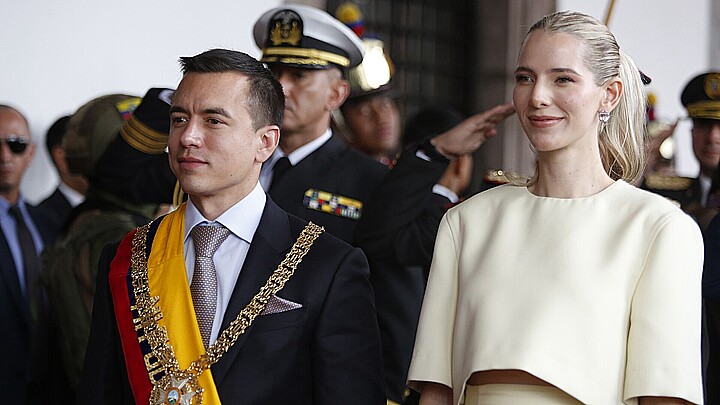Opinion & Reviews
Opinion: The real reason Ecuadorian President Guillermo Lasso dissolved the National Assembly
The Ecuadorian president invoked a constitutional safe harbor provision called “crossed death” which suspends legislative power, but also ends his own term abruptly to hold new elections

May 19, 2023 5:26pm
Updated: January 18, 2024 10:02am
The current state of political affairs Ecuador is one that probably seems unthinkable to those of in other democratic nations. President Guillermo Lasso dissolved the National Assembly, sending all the legislators home without pay until the next election. While at first glance, the move might seem authoritarian in nature, a closer look at the political landscape reveals he actually limited his own mandate to prevent the country from spiraling into a vortex of political conflict.
The legitimately elected president now says he will not complete the four years for which he was supposed to serve, and will instead rule by decree for the next six months and then leave the presidential palace. He has vowed not to run for reelection, according to a report published by the Washington Post.
This constitutional mechanism is called “crossed death.” It is a last resort failsafe, the effect of which empties the legislative and executive power at the same time. “Let the people decide,” is Lasso’s stance on the matter. He made this drastic decision after his opponents made four attempts to remove him from power.
Lasso says he stopped a “macabre plan” designed to remove him from power, a plot designed to orchestrate the return of a fugitive former president. Although Lasso did not say his name, it is understood that the president is referring is Rafael Correa, cocreator of 21st century socialism.
Lasso maintains that the former president´s allies tried to misappropriate the primary functions of the State, starting with the Prosecutor's Office, and then the Comptroller's Office, all part of a move to seize control of the government from his democratically elected administration.
The latter was set on fire during the October 2019 riots in what Nicolás Maduro called the Bolivarian breezes. While Black Lives Matter paralyzed the United States, South America was becoming its cultural equivalent with the phenomenon of “indigenism.”
Just as BLM promotes “racialized socialism,” the leader of the indigenous movement hails “Indo-American communism or barbarism.” By effectuating acts of violence, intimidation and destruction, the riots cost Ecuadorians $821.68 million.
Then, in June 2022 the same forces that kept Ecuador hostage for 18 days denied access to transportation, slashed the wheels of buses, closed roads, and prevented access to food, especially for residents of the capital. An agreement was later reached after discussions were mediated by Ecuador’s Episcopal Conference.
In a country already suffering from with the second highest rate of child malnutrition in Latin America, the indigenous movement burned crops and spilled precious milk needed for children. If farmers dared to work during the “national strike,” there were repercussions.
Socialist legislators exploited the national chaos and used the instability to call for the dismissal of Lasso, but failed due to the resistance of the Social Christian Party, led by Esteban Torres Cobo, a signatory of the Madrid Charter, which commits to the fight against communism.
As an illustration of how quickly allegiances change in the South American country, the Social Christian Party no longer supports Lasso—nor Correa—and more recently joined in the chorus for of support for his impeachment.
In a fourth attempt to remove Lasso, his detractors say there is evidence to incriminate him, and they also accuse him of failing to act in the face of the crisis of violence that the country is suffering. Among the allegations were complaints from Flopec (Ecuador´s Public Oil Fleet). Flopec manager Vice Admiral Johnny Estupiñán filed complaints, compelling Lasso's advisers to defend themselves and deny them.
The vice admiral presented his testimony before the National Assembly on the first day of the single trial under the protection of Viviana Veloz, who previously questioned witnesses during the Correa administration. The vice admiral has said he does not actually want Lasso to actually be removed, but rather wants the circumstances of the country to be addressed.
The first session lasted a whole day, and before holding the second session on May 17, Lasso instead issued decree 741, supported by article 148 of the Constitution, which gives him to power to declare the “crossed death.”
The current Ecuadorian Constitution went into effect in 2008 during Correa’s presidency, an administration which disintegrated Congress and replaced it with the National Assembly. Still, the former president spoke out against Lasso’s application of this constitutional mechanism, despite the fact that he pushed legislators to achieve it during his own term.
Why? Because it is now politically convenient for the Socialists to remove the president than to allow him to govern six more months, sspecially because, in the first three months Lasso would govern without the opposition of the legislative power that is obstructs his free market reforms.
Is it the same situation as Pedro Castillo in Peru?
Another Lasso critic is Evo Morales, former president of Bolivia, who was in exile after trying to remain in power forever. Morales was removed after 14 years in government when a referendum established he could not run for office again.
Morales now accuses Lasso (and the political right) of double standards since Lasso was critical of the former Peruvian President Pedro Castillo, for his own attempt to dissolve Congress, to stay in power.
But this analogy makes no sense since the situations are entirely different.
While Castillo intended to finish his term, Lasso sacrificed his. He cut his presidency to nearly half the length required by law and will now retire after two and a half years in power.
Lasso also took his measures to preserve his country’s constitution whereas Castillo was hijacking the courts of Peru to dissolve the constitution.
Legislators are fighting back
Lawmakers are currently trying to reverse the president's decision by appealing to the Constitutional Court. They say Lasso's actions are unconstitutional. According to article 148 of the Constitution, to apply the “crossed death,” there must be a “serious political crisis and internal commotion.”
Former opposition legislators argue that is no such commotion or crisis, and that the only thing the president is looking for is to avoid the impeachment trial against him.
Lasso says as soon as he issued the executive decree, it took effect, immediately. So, in principle, the Constitutional Court cannot intervene. But there are lawyers who claim otherwise.
When should there be new elections?
Multiple presidential candidates have been announced, since a “crossed death” scenario requires early elections within a period of 90 days after the initial 7 days from the time the National Electoral Council (CNE) announces them.
The same applies to legislators, which must be summoned to elections. If there is no clear presidential winner, there must be an election within 45 days. Then the CNE has 7 days to announce the next president.
During that interim time of vacancy, the Ecuadorian state, and its citizens will save 33 million dollars by not having to pay the salaries of legislators who earn 10 times more than the minimum wage per month.
Given the contrast between the lifestyle of legislators and the average citizen, the decision to dissolve the National Assembly has been largely welcomed by the average citizen.
But the future outlook is uncertain.
Fear is growing that Lasso's departure could strengthen socialism as an oppositional force against freedom.
However, between impeachment and “crossed death,” the latter is the option that offers the most opportunity for the arrival of a new alternative.
Former political prisoner Galo Lara, who was imprisoned for questioning Correa’s government is calling for a single, appealing candidate to oppose Correísmo to avoid dividing the vote among several candidates.
Correa’s former first vice president, Lenin Moreno, who ultimately turned against the president, has said the same. Moreno is well known for dissolving UNASUR, a continental, pro-socialist summit.
Quito mayor and Correísta Pabel Muñoz now intends to restore it. Correísmo currently has many mayors and governors elected in the main cities and provinces of the country, a fact that could leave the entire country without checks and balances if the presidential election does not offer a candidate that counters the former socialist regime’s paradigm.
Since Ecuador is suffering a wave of violence, the presidential candidate who offers to fight crime head-on may ultimately prevail.
Mamela Fiallo Flor is an Ecuador based journalist and social media influencer who is currently writing for ADN America.








